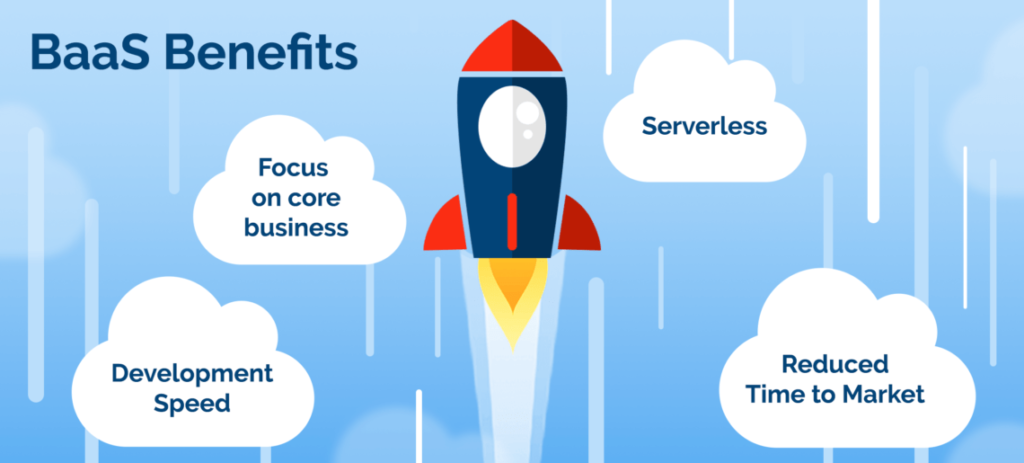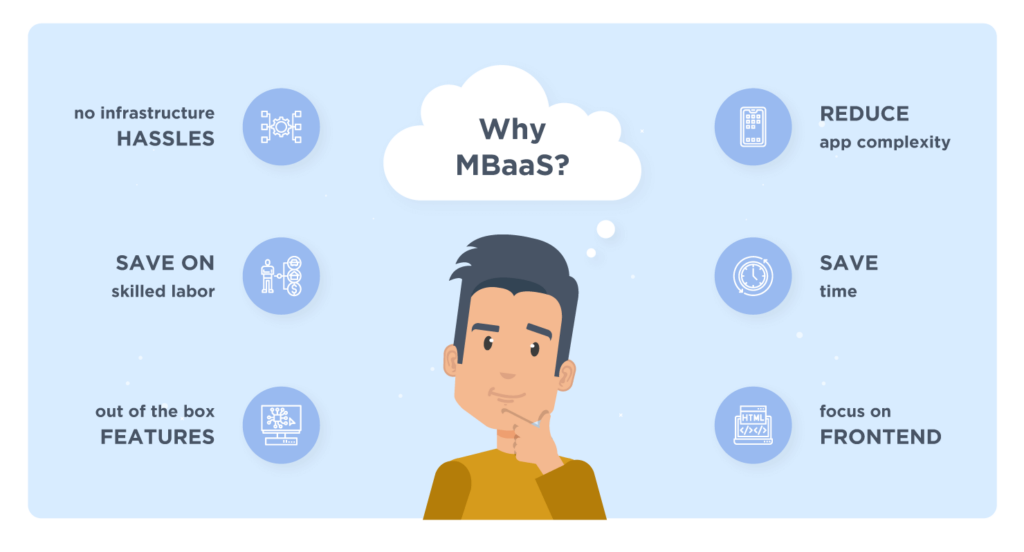
In the digitized corridors of modern business, software stands as the spine of growth, a silent but potent force driving agility, efficiency, and service quality. It is the unseen fulcrum on which the leverage of opportunity pivots, transforming operational landscapes across industries. Within the beating heart of every software application lies a suite of backend services, silent and often invisible, that empower the user experiences we’ve come to rely on daily.
The development of backend technology has traditionally been a complex ballet of technical expertise, often requiring substantial investment in both time and infrastructure. Enter Backend-as-a-Service (BaaS) – the cloud-driven architect that is reshaping the software development paradigm.
BaaS is not just a technological offering; it is the strategic outsourcing of server-side operations that once bogged down innovation with its complexity and cost. Imagine the Backend as a Service market, expanding to multibillion-dollar valuations by 2029, catalyzing growth at a rate previously unimagined. This model allows businesses to launch applications with a skeleton crew of developers, focusing their artistry on the front end while the BaaS providers handle the vast sea of backend complexities.
BaaS operates on a tri-layered architecture that could be considered the digital equivalent of a well-oiled machine. At its base lies the foundation, a sturdy platform where applications find life; the middle layer is the realm of BaaS products, managing a flurry of requests; and the topmost layer is where the magic of connection happens, binding the application to the world wide web.
The case for BaaS is compelling, especially for businesses seeking to accelerate their app launch timelines. By dramatically cutting down on development hours, BaaS allows for rapid setup and deployment, but this is just the tip of the iceberg. Let’s delve into the myriad advantages BaaS brings to the table.
Standardization and Complexity Management:
BaaS not only paves the way for standardized backend development but also shoulders the hefty burden of maintenance, leaving your business free to pursue growth and customer satisfaction.
Features of Backend-as-a-Service (BaaS)
Business Limitations with Backend-as-a-Service
Yet, like all innovations, BaaS is not without its Achilles’ heel. There are trade-offs such as reduced control over coding, potential vendor lock-in, and challenges with custom automatic operations. These limitations require careful consideration and strategic planning to mitigate.

What is MBaaS?
Mobile Backend as a Service (MBaaS) is an essential cog in the wheel of mobile app development. It provides a suite of backend services tailored specifically for mobile applications. These services include but are not limited to, robust database management, seamless security protocols, timely push notifications, reliable hosting, and expansive storage solutions. While MBaaS shares many similarities with BaaS, most service providers have evolved to offer both, ensuring a more holistic backend solution regardless of the platform.

Backend as a Service (BaaS) is rich with features designed to streamline the backend aspect of app development. These typically encompass:
Core Features of Backend as a Service
Selecting the Right BaaS or MBaaS Provider
When it comes to choosing a provider, the landscape is vast. Below are some notable BaaS and MBaaS vendors known for their reliability and diverse service offerings:

Prominent Backend as a Service Providers
Selecting the right BaaS or MBaaS service provider is not one-size-fits-all—it’s a decision that should be tailored to the unique requirements of your project. Collaborating with a seasoned software development team can guide you to pinpoint the ideal vendor, ensuring your application is not only functional but also future-proof.
Challenges of Redundancy vs. the Necessity for Scalability Sprinterra’s technical landscape is cluttered with a multitude of systems whose functions often overlap, creating a dense and unclear technical infrastructure. Utilizing a domain-layered model to dissect these systems reveals a startling discovery: a plethora of systems are upholding a relatively limited array of services, leading to:
This redundancy not only wastes developmental and physical resources but also imposes a significant maintenance burden that includes updating, operating, and monitoring—a daunting task that necessitates architectural overhauls to manage the complexity effectively.
Overburdening Developers and the Impact on Key System Development
Sprinterra’s developers possess a profound technical mastery and practical experience. They are in a unique position, grappling with demanding business scenarios that necessitate top-tier technical prowess. However, the intense developmental workload can hinder their capacity to innovate and maintain critical systems.
During the development phase, developers face the challenging task of designing robust databases and ensuring high levels of security, concurrency, and performance, utilizing a suite of technologies ranging from databases like MySQL and HBase to distributed invocation systems.
In the maintenance phase, the focus shifts to unwavering system stability, which is paramount—especially evident during peak promotional events. Developers are tasked with fortifying system architecture, managing traffic, and optimizing performance.
Yet, this raises critical questions about the allocation of developer skills and labor:
The Blurring Lines Between Business and Technical Platforms Within Sprinterra Cloud, a curious trend is emerging: technical developers drift towards business operations, while business developers venture into platform construction. This tendency not only indicates a pursuit of career advancement driven by KPIs but also hints at a lack of clear career progression paths, exacerbated by unclear role definitions.
Ideally, business development teams should concentrate on meeting business objectives, while technical teams should focus on providing the necessary tools and stable underpinnings for business growth. A clearly defined architecture is essential for delineating these responsibilities.
The Imperative for Integration and Collaboration Standards Addressing the challenge of system complexity requires adopting best practices from enterprise middleware solutions. For instance, in traditional banking, disparate systems are integrated through established standards like EIP and ESB, allowing for a collaborative approach to complex operations. Similarly, standards for inter-system integration within Sprinterra Cloud could significantly reduce complexity and enhance efficiency.
Sprinterra: Your BaaS Partner for a Digital Tomorrow
Sprinterra understands the pivotal role BaaS plays in the modern software ecosystem. With a rich tapestry of backend services tailored to meet the unique needs of your business, Sprinterra can architect a backend solution that not only fits your current operational scope but also scales seamlessly with your future ambitions.
As we peer into the horizon of technological advancements, BaaS stands out as a beacon of innovation, a catalyst for change, and a strategic partner for businesses aiming for the stars. With Sprinterra, the journey towards a robust, resilient, and responsive backend architecture is not just envisioned but executed with precision and passion.
Transformative Design & Development with Sprinterra At Sprinterra, we believe that your ideas deserve the best technological craftsmanship to thrive in the competitive market. That’s where our Backend as a Service (BaaS) comes in — turning your concepts into tangible, market-leading products with unparalleled design and robust infrastructure that deliver both a competitive and a cost advantage.
Exquisite UI/UX That Defines Success Our UI/UX philosophy is simple: create experiences that enchant users and keep them coming back. Our UX architects and UI designers join forces to craft your Minimum Viable Product (MVP), breathe new life into existing interfaces, or conceptualize and design an entirely new product from the ground up. We’re equipped to handle the full spectrum: from in-depth competitor analysis and wireframing to mood board creation and interface design. With Sprinterra, every detail is meticulously crafted to ensure your product stands out.
SaaS Product Development with Cutting-Edge Technologies Our development teams wield a diverse toolkit — Java, Python, Node.js — to architect backends that can effortlessly scale and manage high loads. Simultaneously, our frontend wizards bring the most intricate and visually captivating interfaces into reality with their expertise in AngularJS, React, and BackboneJS. With Sprinterra, your SaaS product isn’t just built; it’s engineered to excel.
Mobile Development for an On-the-Go World The mobile realm is where your ideas become as mobile as your audience. Whether it’s iOS or Android native apps or broader-reaching hybrid, cross-platform applications, our mobile development maestros employ React Native and Flutter to construct high-performance applications with engaging user interfaces.
Serverless Solutions on AWS for the Future Leap into the future with Sprinterra’s serverless infrastructure solutions on AWS. Our specialists harness the power of AWS Lambda, API Gateway, AWS DynamoDB, and AWS Step Functions to create infrastructures that are not just scalable and cost-effective but also primed for the technological advancements of tomorrow.
DevOps: The Pathway to Operational Excellence Sprinterra’s DevOps expertise is your ticket to a seamless technological evolution. We automate CI/CD pipelines, enhancing agility, diminishing costs, and guiding you towards a serverless computing paradigm. With dynamic provisioning and a pay-as-you-go model, we ensure your operations are as efficient as they are innovative.
Quality Assurance That Guarantees Excellence No product reaches the Sprinterra seal of approval without rigorous testing. Our quality assurance engineers come with over two decades of experience in all forms of testing — automation, performance, manual, compatibility, and continuous integration. We don’t just test; we guarantee that your product emerges as the gold standard in its class.
At Sprinterra, your vision is the blueprint for our innovation. You dream it; we engineer it to succeed.
Get the latest insights on exponential technologies delivered straight to you
© 2025 Sprinterra. All rights reserved.